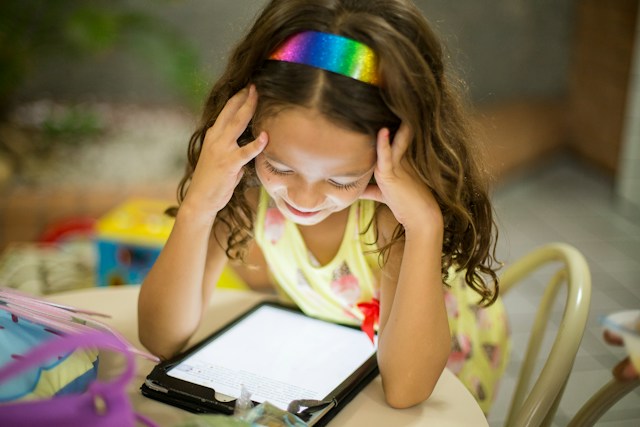Children are not an exception to the rule that screens have become an essential component of daily life in the current digital era. Screens are everywhere—from computers and televisions to cellphones and tablets—and a lot of kids spend a big chunk of their day in front of them. Even though technology may be entertaining and informative, too much screen time can negatively impact a child’s development. Therefore, it’s critical to understand the precise effects of excessive screen time on kids’ cognitive, social, emotional, and physical development.
Physical Growth
Lifestyle Sedentary and Obesity:
– A sedentary lifestyle brought on by excessive screen time generally results in lower levels of physical activity.
– Extended screen time has been linked to childhood obesity because it might result in poor nutritional choices and lower calorie expenditure.
Disruption of Sleep:
– Blue light from screens suppresses the synthesis of melatonin, the hormone that regulates sleep, which can cause disruptions to sleep patterns.
– Children who don’t get enough sleep may experience behavioural issues, impaired cognitive performance, and stunted physical growth.

Issues with Vision:
– Prolonged screen time may aggravate children’s myopia (nearsightedness), dry eyes, and eye strain.
– Extended screen time might result in digital eye strain, which can hurt and give headaches.
Mental Growth
Postponed Language Acquisition:
– Too much screen time might impede young children’s language development and reduce their prospects for in-person interactions.
– When using screens, children may lose out on important opportunities for language learning.
Focus & Attentiveness:
Children’s attention spans may get shorter if they are constantly exposed to fast-paced digital stuff.
– Children who are overstimulated by screens may find it difficult to concentrate on activities that need for prolonged attention.
Academic Achievement:
– Prolonged screen use, especially for amusement purposes, can lead to lower academic achievement. – Children may choose screen time above schoolwork and studying.
Social Advancement
Diminished In-Person Communication:
Overindulgence in screens might prevent kids from having as many opportunities to interact in person with friends and relatives. The development of critical social skills, such empathy and effective communication, may be hampered by this.
Social Detachment:
– Children who spend too much time on screens run the risk of being socially isolated since they are less likely to make friends in real life or take part in group activities.
– Even while they are useful, online connections cannot completely replace in-person social interactions.
Cyberbullying and Security Online:
Youngsters who are around screens are more susceptible to unsuitable information and cyberbullying, among other online dangers. A child’s general wellbeing and sense of self-worth may suffer greatly as a result.
Development of Emotions
Controlling Emotions:
– An excessive amount of screen time might affect a child’s capacity to control their emotions.
– Children who are not as adept at controlling their emotions may develop more prone to mood swings and tantrums.

Anxiety and Depression:
Extended periods of time spent in front of devices, especially on social media, can make kids feel inadequate and anxious.
– Making unrealistic online comparisons to the lives of others might cause unhappiness and low self-esteem.
Symptoms of addiction and withdrawal:
– A strong desire to use screens and withdrawal symptoms when prohibited are signs of screen addiction that some kids may experience.
– Addiction to screens can interfere with day-to-day activities, affecting obligations and relationships.
Techniques for Limiting and Managing Screen Time:
– Parents may set up explicit rules for their children’s screen use, such as time and daily limitations. Children might be encouraged to restrict their screen usage by parents who set a good example.
Prioritise Quality Over Quantity:
– Screen time can be more useful if parents encourage their kids to interact with age- and education-appropriate content.
– Watching and talking about media with kids can improve their educational experience.
Activities for Balancing:
Promoting a healthy balance between screen time and other pursuits like reading, hobbies, and outdoor play is crucial for a child’s overall development.
– Having a varied schedule can aid in the development of a child’s interests and talents.
Encouraging the use of digital literacy
In the digital era, it is essential to teach kids about responsible digital citizenship, critical thinking, and online safety.
Giving kids information about the advantages and possible hazards of screens gives them the power to make wise decisions.
The physical, cognitive, social, and emotional facets of a child’s life can all be negatively impacted by excessive screen usage. It is imperative that parents, carers, and educators acknowledge the possible risks associated with screen usage and take proactive measures to regulate it. Encouraging digital literacy and striking a balance between technology and other activities might help kids succeed in the digital age while preserving their overall development. It’s important to keep in mind that using screens to support a child’s development rather than impede it requires moderation and careful supervision.
You may also like:
Childhood Obesity: Causes, Risks, and Simple Solutions for Parents
Kid-Approved Immunity Boosters: Fun & Easy Recipes They’ll Actually Eat

